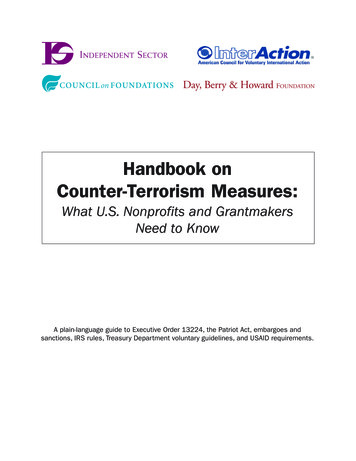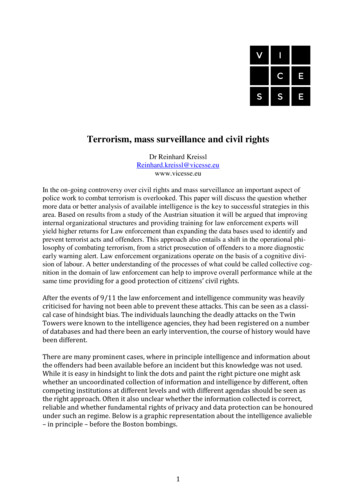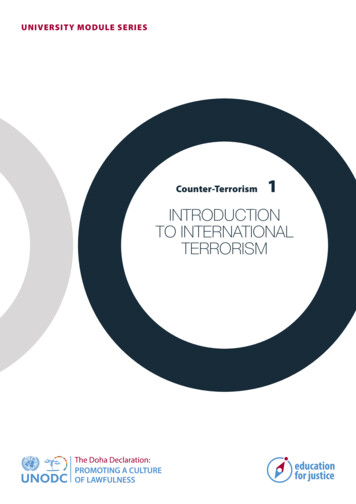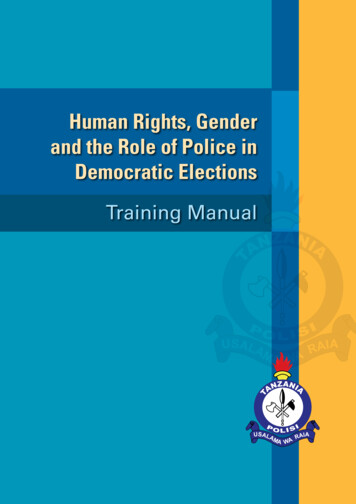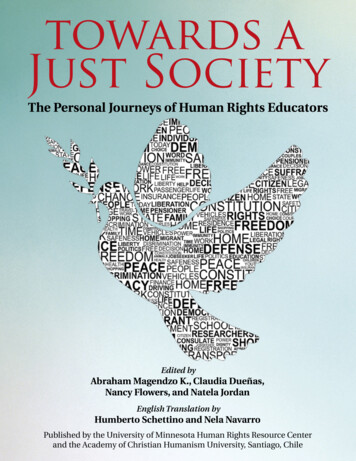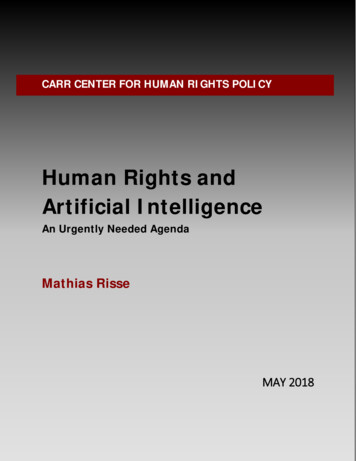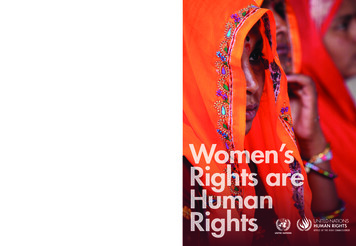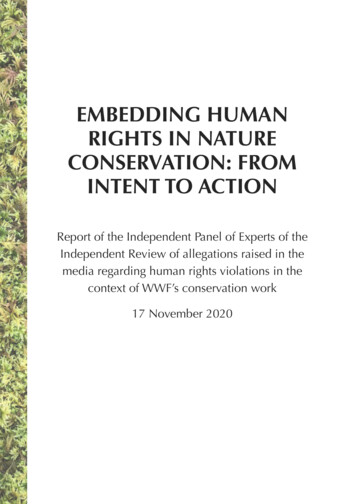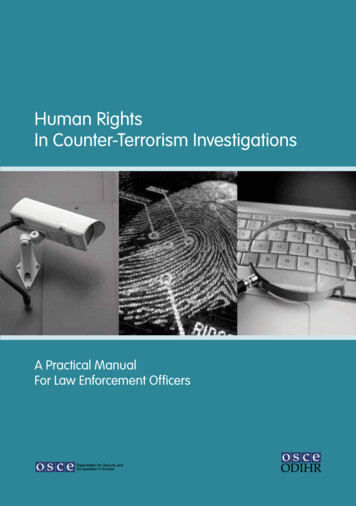
Transcription
Human RightsIn Counter-Terrorism InvestigationsA Practical ManualFor Law Enforcement Officers
Human RightsIn Counter-Terrorism InvestigationsA Practical ManualFor Law Enforcement Officers
Published by the OSCEOffice for Democratic Institutions and Human Rights (ODIHR)ul. Miodowa 1000–251 WarsawPolandwww.osce.org/odihr OSCE/ODIHR 2013All rights reserved. The contents of this publication may be freely used andcopied for educational and other non-commercial purposes, provided thatany such reproduction is accompanied by an acknowledgement of the OSCE/ODIHR as the source.ISBN 978-92-9234-878-6Designed by Homework, Warsaw, PolandPrinted in Poland by Poligrafus Jacek Adamiak
ContentsAcknowledgements 5List of Abbreviations and Acronyms 6Glossary 7Foreword 11Introduction 13Part 1 Ð Intelligence, Pro-active Methods of Investigationand Special Investigation Techniques 171.1 Information and Intelligence-gathering 201.1.1 Gathering Information 211.1.2 Recording and Evaluating Information 251.1.3 Dissemination of Information and Intelligence 291.1.4 Maintenance of Intelligence Systems 301.2 Development of Intelligence, Pro-active Methodsof Investigation and Special Investigation Techniques 321.2.1 Surveillance 331.2.2 Interception of Communications 371.2.3 The Use of Undercover Agents and Informants 401.2.4 Access to Bank Accounts and Other Confidential Information 451.3 The use of Intelligence Material in investigationand legal proceedings 46Template Learning Plan on Intelligence, Pro-active Methodsof Investigation and Special Investigation Techniques 50Part 2 Ð Witnesses, Victims, Crime Scenes and the Seizureand Retention of Evidence 532.1 Witnesses and Victims 542.1.1 Dealing with Witnesses 552.1.2 Witness Security and Protection 592.2 Crime Scenes and the Seizure and Retention of Evidence 612.2.1 Crime Scene Examination 612.2.2 Seizure and Retention of Evidence 63Template Learning Plan on Witnesses, Crime Scenesand the Seizure and Retention of Evidence 66
Part 3 Ð The Arrest, Detention and Processing of Terrorism Suspects 693.1 Arrest and Detention of Suspects 713.2 The Use of Force during Arrest 733.3 Searching Suspects 803.4 Safeguards for Suspects in Detention 823.4.1 The Right to be Promptly Informed about One’s RightsAccording to Domestic Law 853.4.2 The Right to Notify Appropriate Persons of One’s Choiceof One’s Arrest, Detention, Imprisonment and Whereabouts 863.4.3 The Right to Challenge the Lawfulness of One’s Arrest 883.4.4 The Right of Access to Legal Counsel of One’s Choice 883.4.5 Obligation to Secure Medical Attention 913.5 The Questioning of Terrorism Suspects 943 5.1 Torture and Ill-treatment is a Crime in International Lawand Should be Outlawed in Domestic Law 993.5.2 Evidence Obtained by Torture or Ill-treatmentis Inadmissible before any Court 1013.5.3 The Principle of Non-refoulement Absolutely Prohibitsthe Expulsion, Return or Extradition of Terrorism Suspectsto a Country Where they would Face Torture 1033.5.4 Co-operation with Foreign Law Enforcement Agencieswill be Jeopardised 1043.5.5 Torture and Ill-treatment are Ineffective 1053.6 Prolonged Detention and Additional Questioningof Suspects 1113.6.1 Prolonged Detention 1123.6.2 Additional Questioning of Suspects Remanded to Prison Custody 115Template Learning Plan on Arrest, Detentionand Processing of Terrorism Suspects 118Part 4 Ð Security, Integrity and Accountability 1214.1 Security and Integrity of Investigations 1224.2 Accountability 1244.2.1 Civil Society 1274.2.2 The Media 128Template Learning Plan on Security, Integrity and Accountability 130Conclusion 132Annex A: Bibliography and Further Reading 134Annex B: International and Regional Norms and Standards 141Annex C: International and Regional Case Law 147
AcknowledgementsThe OSCE Office for Democratic Institutions and Human Rights (ODIHR) andthe Strategic Police Matters Unit within the OSCE Secretariat TransnationalThreats Department (TNTD/SPMU), would like to thank Michael Kellett (former senior criminal investigator and human rights expert) for his major contribution to the development of the manual. ODIHR and TNTD/SPMU extendthanks to colleagues from the OSCE Transnational Threats Department/Action against Terrorism Unit and the OSCE field operations who collaboratedon this project. ODIHR and TNTD/SPMU are also grateful to the followingexperts that provided feedback, comments and inputs during the drafting ofthe manual:Anja Bienert, Senior Programme Officer, Police and Human RightsProgramme, Amnesty International, Dutch sectionNihad Bunar, Professor, Department of Child and Youth Studies,Stockholm University and Swedish National Police AcademyUlrich Garms, Programme Officer, Terrorism Prevention Branch,United Nations Office on Drugs and CrimeAydan Iyigüngör, Programme Manager, Freedoms and Justice Department,European Agency for Fundamental RightsFriedrich Schwindt, Police Director (retired), international consultanton human rights and police reformCristina Sganga, international consultant on human rights and lawenforcementAnna Tsitsina, Adviser, Terrorism Division, Council of EuropeSteve Wessler, international consultant on human rights
List of Abbreviations and AcronymsCATUnited Nations Convention against Torture and Other Cruel,Inhuman or Degrading Treatment or PunishmentCCTVClosed-circuit televisionCFREUCharter of Fundamental Rights of the European UnionCPTEuropean Committee for the Prevention of TortureECtHREuropean Court of Human RightsEUEuropean UnionIACHRInter-American Commission of Human RightsNGONon-governmental organizationNPMNational Preventive MechanismODIHROSCE Office for Democratic Institutions and Human RightsOSCEOrganization for Security and Co-operation in EuropePEACEInterview model following five phases: Planning andPreparation; Engagement and Explanation; Account, clarification and challenge; Closure and EvaluationSITsSpecial Investigation TechniquesTNTDOSCE Transnational Threats DepartmentTNTD/SPMU OSCE Transnational Threats Department/ Strategic PoliceMatters UnitUDHRUniversal Declaration of Human RightsUNUnited Nations
GlossaryThis glossary clarifies some terms used in this manual and is not intended toprovide official definitions. Throughout the manual, the following key termsshould be understood exclusively in the anti-terrorism context.Arrest: the act of apprehending a person for the alleged commission of anoffence or by the action of an authority.1Data-mining: searching personal data sets based on presumed characteristics of suspects.2Detention: the condition of any person deprived of personal liberty, except asa result of conviction for an offence.3Extraordinary rendition: the transfer – without legal process – of a detaineeto the custody of a foreign state for purposes of detention and interrogation. 4Imprisonment: condition of any person deprived of personal liberty asa result of conviction for an offence. 512345United Nations General Assembly, Resolution 43/173, “Body of Principles for theProtection of All Persons under Any Form of Detention or Imprisonment”, New York,9 December 1988, http://www.un.org/documents/ga/res/43/a43r173.htm .United Nations Special Rapporteur on the promotion and protection of human rightsand fundamental freedoms while countering terrorism, Martin Scheinin, Report to theUN Human Rights Council, 29 January 2007, A/HRC/4/26, para. 35, http://www.un.org/Docs/journal/asp/ws.asp?m A/HRC/4/26 .Body of Principles for the Protection of All Persons under Any Form of Detention orImprisonment, op. cit., note 1.Globalizing Torture, CIA Secret Detention and Extraordinary Rendition (New York: OpenSociety Foundations, 2013), p.13, t/files/globalizing-torture-20120205.pdf .Body of Principles for the Protection of All Persons under Any Form of Detention orImprisonment, op. cit., note 1.
8Human Rights in Counter-Terrorism InvestigationsIncommunicado detention: deprivation of a person’s liberty by state authorities acting in their official capacity, or persons acting under the orders thereof,with the authorization, consent, support or acquiescence of the state, or in anyother situation where the action or omission of the detaining person is attributable to the state, where the person is not permitted any contact with the outside world such as family, friends, independent lawyers and doctors.6Informant: any person who voluntarily provides information to the authorities. They can be former criminals or suspected to be part of or otherwiseassociated with a terrorist group, as well as members of the public. Informantsdo not provide evidence but sporadic information to the authorities.Informant/Undercover agent’s handler: a law enforcement officer who isthe point of contact for an informant or undercover agent. They should be carefully selected and trained to provide advice, support or assistance at very shortnotice. The means of contact and the level of support provided depend on thecircumstances, and may go as far as intervening to extract the informant orundercover agent from danger, if required.Intelligence: raw information that is gathered, processed, interpreted andprotected by law enforcement agencies to decide upon and support criminalinvestigations.7Preventive detention: detention of an individual considered to posea national security threat before an offence has been committed and in theabsence of reasonable suspicion that he or she is about to commit such anoffence.67United Nations Special Rapporteur on the promotion and protection of human rightsand fundamental freedoms while countering terrorism, Martin Scheinin, SpecialRapporteur on torture and other cruel, inhuman or degrading treatment or punishment,Manfred Nowak, Vice-Chair of the Working Group on arbitrary detention, ShaheenSardar Ali, and Chair of the Working Group on enforced or involuntary disappearances,Jeremy Sarkin, “Joint Study on global practices in relation to secret detention in thecontext of countering terrorism”, 20 May 2010, A/HRC/13/42, p. 11, http://www.un.org/Docs/journal/asp/ws.asp?m A/HRC/13/42 .Criminal Intelligence: Manual for Front-line Law Enforcement (Vienna: United Nations, 2010),p.9, w-Enforcement/CriminalIntelligence for Front Line Law Enforcement.pdf .
Glossary9Principle of non-refoulement: absolute prohibition to return, expel or extradite a person to another state where there are substantial grounds for believing that the person would be in danger of being subject to torture, inhuman ordegrading treatment.8Pro-active methods of investigation: methods of investigation, startingwith a suspect and using a variety of strategies to discover and demonstratehis or her involvement in various offences, previously recorded or not.Profiling: a systematic association of sets of physical, behavioural or psychological characteristics with particular offences and their use as a basis formaking law-enforcement (investigative) decisions. 9Reactive methods of investigation: methods of investigation that can becharacterized as the application of a set of standard procedures after a terrorism-related crime, such as when a terrorist bombing has been committed.Secret detention: situation in which (a) person(s) is held in incommunicadodetention and where the detaining or otherwise competent authority denies,refuses to confirm or deny or actively conceals the fact that the person isdeprived of his or her liberty from the outside world, or refuses to provide oractively conceals information about the fate or whereabouts of the detainee.Secret detention can take place in official and unofficial places of detention.10Special Investigation Techniques: techniques used to gather information,such as electronic or other forms of surveillance and undercover operations, insuch a way so as not to alert the target person(s) and for the purpose of detecting and investigating offences. 11891011United Nations, Convention against Torture and Other Cruel, Inhuman or DegradingTreatment or Punishment (CAT), New York, 10 December 1984, Article 3, http://www.un.org/documents/ga/res/39/a39r046.htm .United Nations Special Rapporteur on the promotion and protection of human rightsand fundamental freedoms while countering terrorism, op. cit., note 2, para. 33.Ibid, p.11.Council of Europe Committee of Ministers, Recommendation Rec(2005)10 on “special investigation techniques” in relation to serious crimes including acts of terrorism, Strasbourg,20 April 2005, Chapter 1, https://wcd.coe.int/ViewDoc.jsp?id 849269&Site COE . Seealso Philippe De Koster P, Terrorism: Special Investigation Techniques (Strasbourg: Council ofEurope Publishing, 2005), p.13.
10Human Rights in Counter-Terrorism InvestigationsSurveillance: the monitoring and gathering of information about (a) specificperson(s), including the observation or listening to (a) person(s), their movements, conversations or other activities. It may be conducted with or withoutthe use of a surveillance device and includes the recording of any information obtained. Surveillance is used for a specific defined purpose and limitedin time.Torture: “an act by which severe pain or suffering, whether physical or mental, is intentionally inflicted on a person for such purposes as obtaining fromhim or a third person information or a confession punishing him for an acthe or a third person has committed or is suspected of having committed, orintimidating or coercing him or a third person, or for any reason based on discrimination of any kind when such pain or suffering is inflicted by or at theinstigation of or with the consent or acquiescence of a public official or otherperson acting in an official capacity. It does not include pain or suffering arising only from, inherent in or incidental to lawful sanctions.”12Undercover agent: any law enforcement officer or other person, includingformer members of a terrorist group or otherwise associated with it tasked byhandlers with gathering information and evidence covertly, for instance byinfiltrating an organization suspected of terrorism-related offences. In someOSCE participating States, only law enforcement officers can be involved inundercover operations.Witness: anyone who may give evidence during an investigation and/orbefore a court, other than suspects, which can include victims of terrorist acts.12United Nations, Convention against Torture and Other Cruel, Inhuman or DegradingTreatment or Punishment (CAT), New York, 10 December 1984, Article 1, http://www.un.org/documents/ga/res/39/a39r046.htm .
ForewordThe OSCE participating States committed themselves to protect and respecthuman rights in the fight against terrorism as early as the Madrid Meeting in1983. This approach reflects the OSCE comprehensive and cross-dimensionalconcept of security, which recognizes that security goes beyond politico-military issues to fully encompass economic, environmental and human rightsissues. Efforts to counter security threats should, therefore, be undertaken inall three OSCE dimensions of security: the politico-military dimension, theeconomic and environmental dimension, and the human dimension.The OSCE views security as anchored in the respect for human rights, democracy and the rule of law, and relates the maintenance of peace to the protection of human rights and fundamental freedoms. Similarly, the 2006 UnitedNations Global Counter-Terrorism Strategy places respect for human rightsand the rule of law at the very core of any counter-terrorism measures. Inthe 2012 OSCE Consolidated Framework for the fight against terrorism,13 theOSCE participating States strongly reaffirmed that such an approach is wellsuited to address challenges posed by terrorism and ensure the respect for therule of law, human rights and fundamental freedoms.The OSCE Office for Democratic Institutions and Human Rights (ODIHR) isthe principal OSCE institution within the human dimension and assists the 57OSCE participating States in fulfilling their human dimension commitments.The Strategic Police Matters Unit of the Transnational Threats Departmentin the OSCE Secretariat assists participating States in police development,reform of criminal justice systems, law enforcement co-operation and effortsto combat organized crime in line with the OSCE Strategic Framework forPolice-Related Activities and the OSCE Concept for Combating the Threat ofIllicit Drugs and the Diversion of Chemical Precursors.13OSCE Permanent Council, Decision No. 1063, “OSCE Consolidated Framework for thefight against terrorism”, Dublin, 7 December 2012, http://www.osce.org/pc/98008 .
12Human Rights in Counter-Terrorism InvestigationsIn particular, ODIHR has been mandated to support the OSCE participatingStates in developing and implementing human rights-compliant measuresto prevent and counter terrorism.14 As part of this mandate, in 2007 ODIHRpublished Countering Terrorism, Protecting Human Rights: A Manual, whichfocuses on the main human rights at risk in the anti-terrorism context andways to ensure the protection of human rights in compliance with international human rights standards and OSCE human dimension commitments.The manual has also aided in training sessions throughout the OSCE regionby providing law enforcement officers with practical tools to enable them torespect international human rights standards and OSCE commitments.ODIHR and the TNTD/SPMU have combined their expertise on human rightsand democratic policing respectively to produce this manual, which exploresin detail the different phases of counter-terrorism investigations and linksthem to relevant human rights standards.We believe that this manual, by examining the topic of protecting humanrights in such investigations from an operational point of view, will providelaw enforcement officers in the OSCE region with useful and concrete guidance to both respect human rights in their daily work, as well as more effectively and successfully investigate terrorism-related acts.Ambassador Janez LenarčičDirector, OSCE Office for Democratic Institutions and Human RightsAlexey LyzhenkovCo-ordinatorDepartment for Addressing Transnational ThreatsOSCE Secretariat14Ibid; and OSCE Ministerial Council, Annex to Ministerial Council Decision No. 1, “TheBucharest Plan of Action for Combating Terrorism”, Bucharest, 3–4 December 2001, http://www.osce.org/mc/40515 .
Introduction“There should be no conflict between human rights and policing.Policing means protecting human rights.”15Human rights are an integral element of all police operations and their practical application is an essential part of any successful investigation. They arethe allies of effective police work. Paying attention to the rights and particular needs of the men, women and children who are part of the communitythat a police officer serves makes the police more effective. This principleapplies as much to terrorism-related crimes as it does to other crimes. It istrue that the emotion generated by terrorist acts may cloud the judgement ofeven the most stoic police officer and that the often covert and intense natureof terrorism-related investigations can give rise to acute and specific humanrights concerns. However, similar emotion and similar issues often arise ininvestigations of other serious crimes.It is a fundamental requirement of international human rights law that a fairtrial depend on a fair and impartial investigation conducted in full compliance with legal and human rights standards. A failure to apply these standards increases the risk of offenders escaping justice. Convictions are renderedunsafe either because innocent people subjected to torture or ill-treatmentconfess to something they have not done, or because of breaches of therespect for private and family life during surveillance or evidence-gatheringoperations, for example. In such cases, a court of first-instance can refuse toconvict or a court of appeal could overturn the conviction.This is not a hypothetical point. The legal reports about a number of OSCEparticipating States by bodies such as the European Court of Human Rights(ECtHR) and the Inter-American Commission of Human Rights (IACHR)161516A New Beginning: Policing in Northern Ireland, the Report of the Independent Commissionon Policing for Northern Ireland (Colegate: Crown, 1999), para. 4.1, 99.pdf .References will be made throughout the manual to the case-law of international bodies.
14Human Rights in Counter-Terrorism Investigationsdemonstrate that the respect for human rights is the cornerstone of lawenforcement efforts to counter terrorism. Respect for human rights in counter-terrorism investigation and prosecution is a pre-condition to effectivelypreventing terrorism. Failure to respect and protect human rights is one ofthe conditions conducive to terrorism; human rights-compliant investigationsare, therefore, key in any effort to counter this security threat.17Respect for human rights – of terrorism suspects, victims, witnesses andpolice officers alike – also ensures that the innocent are not wrongly convicted and that the offenders do not walk free. Respect for human rights principles is, therefore, a practical necessity, essential to effective investigation.That is what this manual is about.In recent years, ODIHR and the OSCE Transnational Threats Departmenthave produced a number of manuals and guidebooks designed to strengthendemocratic policing in OSCE participating States and to protect humanrights while countering terrorism.18 In particular, in 2007 ODIHR publishedCountering Terrorism, Protecting Human Rights: A Manual.19 This is a comprehensive, thorough and detailed examination of the international legal andhuman rights standards that apply to the fight against terrorism and hasbeen used successfully as part of training programmes throughout the OSCEregion. It is of value to police officers, prosecutors, judges, lawyers, academicsand civil society organizations.171819United Nations General Assembly, Resolution 60/288, “The United Nations GlobalCounter-Terrorism Strategy”, 20 September 2006, rrorism.shtml and OSCE Ministerial Council, MinisterialStatement, “Supporting the United Nations Global Counter-Terrorism Strategy”, Madrid,30 November 2007, http://www.osce.org/mc/29544 .Guidebook on Democratic Policing by the Senior Police Adviser to the OSCE SecretaryGeneral (Vienna: OSCE, 2008), http://www.osce.org/spmu/23804 ; Good Practicesin Building Police-Public Partnerships by the Senior Police Adviser to the OSCE SecretaryGeneral (Vienna: OSCE, 2008), http://www.osce.org/spmu/32547 ; Good Practices inBasic Police Training – Curricula Aspects (Vienna: OSCE, 2009); -SPM-3555-EN-2732 ; Trafficking in Human Beings:Identification of Potential and Presumed Victims – A Community Policing Approach (Vienna:OSCE, 2011), http://www.osce.org/node/78849 ; and Guidelines on Human RightsEducation for Law Enforcement Officials (Warsaw: OSCE/ODIHR, 2012), http://www.osce.org/odihr/93968?download true .Countering Terrorism, Protecting Human Rights: A Manual, (Warsaw: ODIHR, 2007) http://www.osce.org/odihr/29103 .
Introduction15Purpose and structure of the manualThis present manual focuses on the investigation process and has been produced following requests from law en
and Special Investigation Techniques . 1.2.1 Surveillance . files/globalizing-torture-20120205.pdf . 5 Body of Principles for the Protection of All Persons under Any Form of Detention or Imprisonment, op. cit., note 1. 8 Human Ri
